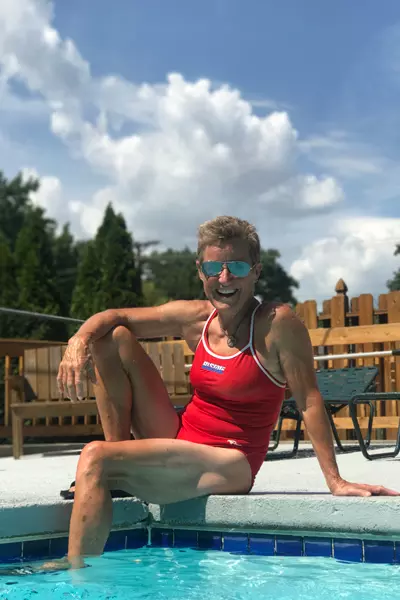- Home
- Patient Stories
- Rotator Cuff Tear - Melanie Getz
Elite international athlete makes full recovery after rotator cuff repair surgery
Featured patient: Melanie Getz
Rotator Cuff Repair
 Melanie Getz is a humble yet energetic 59-year-old woman. She works for Bi-state pool and spa supervising the Brentwood Forest pool. When she mentions her love of weight lifting, it takes quite a while before she reveals she also happens to be an elite international athlete in power lifting and Olympic lifting with national and world titles. She later went on to compete in triathlons.
Melanie Getz is a humble yet energetic 59-year-old woman. She works for Bi-state pool and spa supervising the Brentwood Forest pool. When she mentions her love of weight lifting, it takes quite a while before she reveals she also happens to be an elite international athlete in power lifting and Olympic lifting with national and world titles. She later went on to compete in triathlons.
In 2012, while training for triathlons in a master swim team class, the front of her shoulder became tight. She went to see a shoulder specialist who told her that she had torn her rotator cuff and advised surgery. “Everyone else I see that has had shoulder surgery can’t raise their arm,” said Melanie. “I did not want to have surgery to simply function, I wanted to have this surgery to [continue to] train my tail off,” she said.
She decided to talk to other athletes about their experience with shoulder surgery. Concerned, her friends urged her to get a second opinion. She chose to see Jay Keener, MD, a Washington University orthopedic shoulder specialist at Barnes-Jewish Hospital, and was able to get an appointment right away. From her first conversation with Dr. Keener, Melanie realized, “He wasn’t just going to operate on my shoulder – he operated on MY shoulder with the goals of restoring me back to an active lifestyle. They [Washington University orthopedic surgeons] do surgery on who you are — according to what your goals are — and they will bend over backwards so you will reach the goals you want to reach,” she said.
After consultation with Dr. Keener, Melanie enrolled in a National Institutes of Health (NIH) funded study led by Dr. Keener, examining the potential risks of future degenerative rotator cuff tear development in the opposite shoulder. Six weeks later, Melanie had arthroscopic rotator cuff repair surgery in her painful shoulder performed in an outpatient facility. Leading up to and after the surgery, the communication among staff, doctors and nurses was, “unbelievable,” according to Melanie because it was all in one setting. Melanie felt like everyone was working with her and no one else. Melanie healed quickly and her shoulder function was restored with 5-6 months, although it took 8 months to recover full strength. Melanie was able to resume all daily and recreational activities.
A unique feature of Melanie’s care was the discovery of a painless rotator cuff tear in the opposite shoulder identified with shoulder ultrasound. “This study is extremely valuable for patients by allowing our research team to identify rotator cuff problems before pain onset and closely follow tears to identify risk factors for pain development and tear enlargement,” said Dr. Keener, a NIH funded researcher. “This research has helped to define the natural history of rotator cuff disease and greatly improved our understanding of the progression of certain rotator cuff tears”. Melanie was monitored at regular intervals to assess shoulder function and possible changes in her rotator cuff in the opposite shoulder. Four years later, after developing pain in the research shoulder, it was discovered that this rotator cuff tendon tear was enlarging. She underwent surgery to repair the tear and, similar to the original shoulder, has made a full recovery. Today, Melanie is back in the gym full force. She is enrolled in a boot camp where she flips tires and continues to train with similar intensity as in previous years.
“This research has greatly improved our ability to predict which tears will become problematic in the future,” notes Dr. Keener. “Additionally, we can intervene early before severe muscle changes occur in tears that have enlarged, which will provide a more complete recovery and return of function.” Melanie’s care is a great example of how clinical research can translate to improved patient outcomes. “We emphasize a science-based team approach to the diagnosis, counseling and treatment of rotator cuff disease,” according to Dr. Keener. In Melanie’s case, it has made all the difference.
More Info: